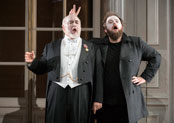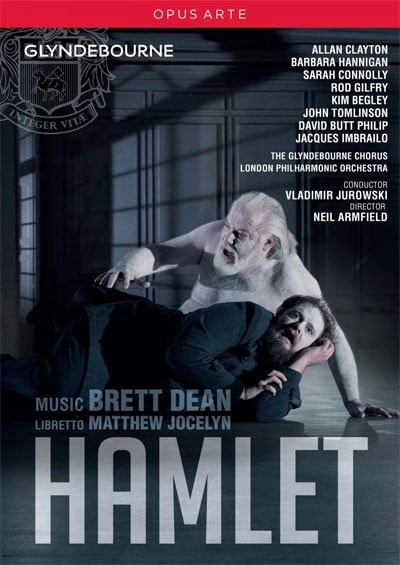OPERA SEARCH

Hamlet
(2013-16)Libretto by Matthew Jocelyn after William Shakespeare (E)
Major roles: colS,M,2CT,2T,Bar,BBar,B; minor roles to be sung by chorus members; chorus;
3(II,III=picc,afl).2(II=corA).5*(II=bcl,III=dbcl).2(II=dbn)-4.4*.3.1-perc(4*).timp-accordion-harp-kbd(pft,laptop)-strings(10.8.6.6.4)
* from within these numbers, two identical trios will be taken, each consisting of 1 clarinet, 1 trumpet and 1 percussion, to be stationed in the theatre throughout.
A sound designer for the PA system is recommended
Abbreviations (PDF)
Bote & Bock
Glyndebourne Opera House, Lewes
Neil Armfield, director
Conductor: Vladimir Jurowski
Company: Glyndebourne Chorus / London Philharmonic Orchestra
| HAMLET | Lyric Dramatic Tenor |
| OPHELIA | Dramatic Coloratura Soprano |
| CLAUDIUS | Dramatic Bass-Baritone |
| GERTRUDE | Lyric Mezzo-Soprano |
| POLONIUS | Character Tenor |
| HORATIO | Lyric Baritone |
| GHOST / GRAVEDIGGER / PLAYER 4 | Dramatic Low Bass |
| LAERTES | Tenor |
| ROSENCRANTZ | Countertenor |
| GUILDENSTERN | Countertenor |
| MARCELLUS / PLAYER 3 | Baritone |
| PLAYERS 1 & 2 | Tenors |
| Attendants, courtiers and spectators | stage chorus (min.32 voices) |
| semi-chorus (in orchestra pit) | (min.8 voices) |
| an accordionist | (on-stage) |
Elsinore, Denmark: King Hamlet has died, mourned by his son, Prince Hamlet of Denmark. The King’s funeral is followed fast upon by the marriage of his widow Gertrude, to his brother, Claudius. Hamlet is deeply disturbed by his father’s untimely death and his mother’s ‘o’er hasty marriage’, a state aggravated by the appearance of King Hamlet’s ghost, informing Hamlet that he was in fact murdered by his brother, now husband to Gertrude and King of Denmark. The dead King asks that his son avenge his death by killing Claudius.
Unsure what to do, whilst adopting erratic behaviour, Hamlet rejects his soul-mate and Iover Ophelia, and dismisses his former classmates, Rosencrantz and Guildenstern, who have been summoned by Claudius to Elsinore to help discover the cause of Hamlet’s apparent madness.
A group of players arrive in Elsinore. Hamlet asks them to perform a scene mimicking the murder of King Hamlet by his brother. Claudius reacts violently to the performance, proof in Hamlet’s eyes of his stepfather’s guilt. Called to his mother’s chamber to explain his actions, Hamlet comes upon Claudius deep in prayer, yet finds himself unable to kill him.
Once with his mother, Hamlet hears a muffled cry and, thinking that Claudius is spying on him, runs his sword through the arras, killing the unsuspecting Polonius, Ophelia’s father. Hamlet then berates his mother for her shamelessness and debauchery. His father’s ghost appears, reminding Hamlet of his primary mission to avenge his death.
Laertes, Polonius’s son, returns to Elsinore to avenge his father’s death, threatening Claudius and his kingship. Claudius manages to allay Laertes’ violence by convincing him that Hamlet is the guilty one: together, Claudius and Laertes conspire to kill him.
Ophelia appears, apparently driven mad by Hamlet’s rejection and the death of her father. This only serves to harden Laertes’ resolve for vengeance as does, moments later, Ophelia’s death – she has drowned in a nearby stream.
Hamlet and his friend Horatio happen upon Ophelia’s funeral, and upon learning of her death, Hamlet provokes Laertes. Through the intermediaries Rosencrantz and Guildenstern, and according to the plan concocted with Claudius, Laertes challenges Hamlet to a duel. Hamlet accepts the challenge. Many deaths ensue.
Matthew Jocelyn
"Brilliant music, rapturously received... Dean is rare among contemporary opera composers in understanding how to present people singing together - the forceful duets, ensembles and choruses are highlights of the score..."
Daily Telegraph
"…a dark, complex, sometimes wryly postmodern slant on the play… there are no limits to where Dean finds his music – amplified chattering noises, singing groups from the balconies, and a virtuoso array of orchestral effects like the gravedigger’s otherworldly whistling."
Financial Times
"...this is the operatic event of the year... The orchestra evokes Dean's grippingly atmospheric sounds with a fascinating spectrum of colour and unerring virtuosity."
Sunday Times
"... it rises to the challenge set by Shakespeare’s great play... new opera doesn’t often get to sound this good."
The Guardian
"…heart-wrenchingly beautiful opera... sonically mesmerising."
Sydney Morning Herald
"…a psychological drama has been created which focuses on the tense web of relationships in the Danish royal family."
Frankfurter Allgemeine Zeitung
There is no definitive version of Shakespeare’s Hamlet. There were at least three versions printed within his lifetime or shortly thereafter, and endless variations, including the most commonly used 1st Folio, and an incalculable number of conflated versions.
Our Hamlet relies heavily on Shakespeare’s verse, if not necessarily on the standard chronology of scenes. The opera concentrates primarily on the domestic drama, exploring the depths of Hamlet’s quest for both understanding and revenge, from the death of his father through to his own demise.
This quest is relayed through the fragmentary nature of his relationships with those in his inner circle. It is this very fragmentation – as well as the lack of a definitive text upon which to base the opera – that allows us to explore the most effective and poetically resonant assemblage of story-lines.
Brett Dean
Tragic

Allan Clayton, Barbara Hannigan, Sarah Connolly, Rod Gilfry, Kim Begley, John Tomlinson, David Butt Philip, Jacques Imbrailo / London Philharmonic Orchestra / The Glyndebourne Chorus / Vladimir Jurowski, cond. / Neil Armfield, dir. (Glyndebourne 2017, WP)
Opus Arte OA 1254 D (DVD) / OA BD7231 D (Blu-ray)

